2026-01-24 Sat
■ #6116. 1月31日(土),朝カル講座の冬期クール第1回「very --- 「本物」から大混戦の強意語へ」が開講されます [asacul][notice][intensifier][adverb][semantic_change][lexicology][onomasiology][kdee][hee][etymology][french][loan_word][borrowing][hel_education][helkatsu][conversion][synonym]
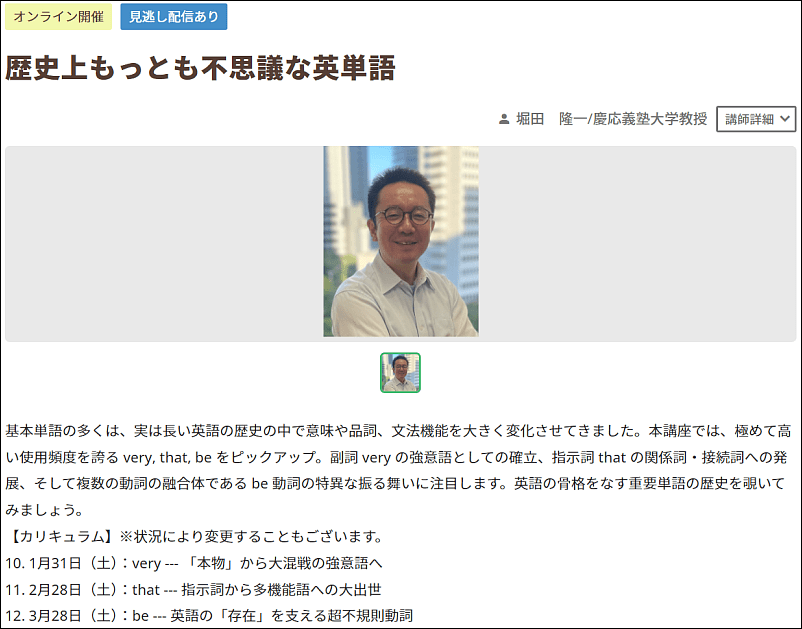
今年度は月1回,朝日カルチャーセンター新宿教室で英語史講座を開いています.シリーズタイトルは「歴史上もっとも不思議な英単語」です.英語史的に厚みと含蓄のある英単語を1つ選び,そこから説き起こして,『英語語源辞典』(研究社)や『英語語源ハンドブック』(研究社)等の記述を参照しながら,その英単語の歴史,ひいては英語全体の歴史を語ります.
1週間後,1月31日(土)の講座は冬期クールの初回となります.今回取り上げるのは,英語学習者にとって(そして多くの英語話者にとっても)最も馴染み深い副詞の1つでありながら,その来歴に驚くべき変遷を隠し持っている very です.
私たちは普段,何気なく「とても,非常に」という意味で very を使っています.機能語に近い役割を果たす,ごくありふれた単語です.しかし,英語史の観点からこの語を眺めると,そこには「強調」という人間心理につきまとう,激しい生存競争の歴史が見えてきます.以下,very をめぐって取り上げたい論点をいくつか挙げてみます.
・ 高頻度語の very は,実は英語本来語ではなく,フランス語からの借用語です.なぜこのような基礎的な単語が借用されるに至ったのでしょうか.
・ フランス語ではもともと「真実の」を意味する形容詞 (cf. Fr. vrai) であり,英語に入ってきた当初も形容詞として用いられていました.the very man 「まさにその男」などの用法にその痕跡が残っています.これがいかなるきっかけで強意の副詞となり,しかもここまで高頻度になったのでしょうか.
・ 強意語には「強意逓減の法則」という語彙論・意味論上の宿命があります.強調表現は使われすぎると手垢がつき,強調の度合いがすり減ってしまうのです.
・ 英語史を通じて,おびただしい強意語が現われては消えていきました.古英語や中英語で使われていた代表的な強意語を覗いてみます.
・ 多くの強意語が消えゆく(あるいは陳腐化する)なかで,なぜ very は生き残り,さらに現代英語においてこれほどの安定感を示しているのでしょうか.大きな謎です.
・ 一般的に「強調」とは何か,「強意語」とは言語においてどのような位置づけにあるのかについても考えてみたいと思います.
このように,very という一見単純な単語の背後に,形容詞から副詞への品詞転換,意味の漂白化,そして類義語との競合といった,英語語彙史上ののエッセンスが詰まっています.このエキサイティングな歴史を90分でお話しします.
講座への参加方法は,今期もオンライン参加のみとなります.リアルタイムでの受講のほか,2週間の見逃し配信サービスもあります.皆さんのご都合のよい方法でご参加いただければ幸いです.開講時間は 15:30--17:00 となっています.講座と申込みの詳細は朝カルの公式ページよりご確認ください.
なお,冬期クールのラインナップは以下の通りです.2026年の幕開けも,皆さんで英語史を楽しく学んでいきましょう!
- 第10回:1月31日(土) 15:30?17:00 「very --- 「本物」から大混戦の強意語へ」
- 第11回:2月28日(土) 15:30?17:00 「that --- 指示詞から多機能語への大出世」
- 第12回:3月28日(土) 15:30?17:00 「be --- 英語の「存在」を支える超不規則動詞」
・ 寺澤 芳雄(編集主幹) 『英語語源辞典』新装版 研究社,2024年.
・ 唐澤 一友・小塚 良孝・堀田 隆一(著),福田 一貴・小河 舜(校閲協力) 『英語語源ハンドブック』 研究社,2025年.
2026-01-20 Tue
■ #6112. OED の12月アップデートで日本語からの借用語が11語追加! [oed][borrowing][loan_word][japanese][lexicology][maltese][notice][tufs][world_englishes][maltese_english][world_englishes]
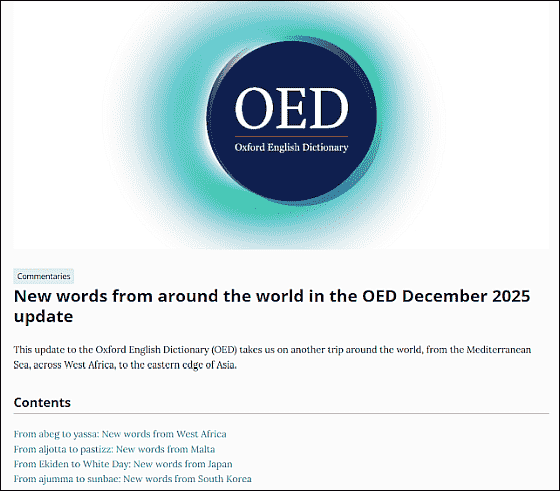
OED Online は,3ヶ月に一度アップデートされます.最新のアップデートは昨年12月のもので,西アフリカ,マルタ,日本,韓国という4つの地域からの借用語に焦点が当てられています.日本語からの借用語も11語含まれていました.
英語史や語彙論の観点から,それぞれのセクションを要約しつつ,コメントを加えたいと思います.まずは "From abeg to yassa: New words from West Africa" です.ナイジェリア,ガーナ,ガンビア,リベリア,シエラレオネといった国々からの借用語が紹介されています.例えば,ガーナの伝統的なダンス Adowa (1928) や,ナイジェリア英語の bend down (and) select (古着,または古着市場)などがエントリーされることになったとのことです.正直なところ私にとっては縁遠い語彙という印象が拭えません.しかし,これらの国々では英語が公用語やそれに準ずる言語として機能しており,独自の英語変種 (World Englishes) が豊かに育っているという事実を,再認識させられました.
次に "From aljotta to pastizz: New words from Malta" です.地中海の島国マルタの英語変種(Maltese English)からの語彙です.マルタ語 (Maltese) は,EU の公用語の中で唯一,セム語派 (Semitic) に属しながらラテン文字で表記される言語です.記事内に,次の記述があります.
Maltese is the only Semitic language written in the Latin alphabet and is the only Semitic and Afroasiatic language among the official languages of the European Union.
今回追加された pastizz (リコッタチーズや豆の入ったパイ)や aljotta (魚のスープ)などは,イタリア語やシチリア語の影響も色濃く反映しており,言語混交の歴史を感じさせます.マルタの言語事情については,「#2228. マルタの英語事情 (1)」 ([2015-06-03-1]) や「#2229. マルタの英語事情 (2)」 ([2015-06-04-1]) をご覧ください.
さて,hellog として最も注目すべきは,もちろん "From Ekiden to White Day: New words from Japan" のセクションです.今回 OED に追加された日本語由来の英単語は以下の11語です.
・ brush pen (筆ペン)
・ Ekiden (駅伝)
・ love hotel (ラブホテル)
・ mottainai (もったいない)
・ Naginata (なぎなた)
・ PechaKucha (ペチャクチャ)
・ senbei (煎餅)
・ senpai (先輩)
・ Washlet (ウォシュレット)
・ White Day (ホワイトデー)
・ yokai (妖怪)
まず love hotel ですが,日本の独特な文化的空間を表す語として,もっと早く OED に取り入れられもよかったのではないかと思っていますが,今回晴れて(?)の収録となりました.関連して「#142. 英語に借用された日本語の分布」 ([2009-09-16-1]) もご覧ください.商標である Washlet も同様に,日本のトイレ文化の象徴として世界に認知された証でしょう.
興味深いのは mottainai の品詞分類です.日本語では形容詞ですが,OED では間投詞(および名詞)として登録されています.環境問題の文脈で「なんてことだ,もったいない!」という文脈で使われることが多いのだと思われます.
煎餅大好き人間としては,個人的に senbei の追加には拍手を送りたいと思います.定義の中で "usually . . . served with green tea" (たいてい緑茶とともに出される)と,日本の茶の間文化まで記述されているのがナイスです.
一方,PechaKucha については,私は寡聞にして無知でした.どうやら,20枚のスライドを各20秒でプレゼンする形式を指すそうです.Naginata や Ekiden は正統派の借用語と言えますが,senpai はサブカルチャー経由の借用語として存在感を示しているようです.海外のアニメファンの間では「自分に気づいてほしい憧れの対象」という文脈で notice me, senpai のようなミームで使われています.意味・語用の変容が生じていますね.
最後に "From ajumma to sunbae: New words from South Korea" です.ここには ajumma が入りました.日本語の「おばちゃん」に相当する語ですが,パーマヘアやサンバイザーといったステレオタイプな特徴とともに記述されているのがユニークです.
世界各地から英語へと流れ込む語彙の流入はとどまることを知りません.次回の OED アップデートも楽しみです.
2026-01-10 Sat
■ #6102. 古英語と現代英語の "false friends" [false_friend][semantic_change][borrowing][loan_word][cognate][oe]
フランス語で faux amis として知られ,日本語で説明的に訳せば「類似形異義語」となる false friends という存在については,本ブログでも false_friend の各記事で具体例を取り上げてきた.英語史や英語語彙論の文脈では,たいていフランス語からの借用語と,そのオリジナルのフランス語単語との間で意味がずれているペアのことを指す.英語 magazine (雑誌)と仏語 magasin (店)などが false friends の典型例である(cf. 「#4899. magazine は「火薬庫」だった!」 ([2022-09-25-1])).
通常 false friends という場合には,このように借用語について言われるものだと思っているが,借用語に限らずに一般に広げて考えることもできる.例えば2つの言語に(借用によらない)同根語があり,それぞれ意味が異なっているケースだ.英語 gift (贈り物)とドイツ語 Gift (毒)などがその例だ.歴史的には,いずれかあるいは両方の言語で意味変化 (semantic_change) が起こった場合に,結果としてこのような false friends が生まれることになるだろう.
さらに false friends の範囲を広げれば,古英語の単語とその現代英語における発達形との間で意味が異なるケースにも応用できそうだ."diachronic/historical false friends" とでも呼ぶべき代物だ.なんと Barney による古英語語彙の入門書 Word-Hoard の巻末に,この意味での false friends が一覧されている.Barney (87) が最も重要な21ペアとして挙げているものを引用しておきたい.
False Friends
The "Index to the Groups" shows several examples of ModE reflexes of OE words which no longer have the same meaning, and which frequently confuse the beginning student. Here is a list of some which appear in this Word-Hoard. (Note that the pret.-pres. verbs are special offenders.)
cræftiġ normally means not "crafty" BUT "powerful" cunnan "can" "know (how)" dōm "doom" "judgement" drēam "dream" "festivity" drēoriġ "dreary" "bloody" or "grieving" eorl "earl" "warrior", "nobleman" folc "folk" "army" grimm "grim" "fierce" magan "may" "can, be able" mōd "mood" "mind, spirit" *mōtan "must" "may, be permitted" rīċe "rich" "powerful" sār "sore" "grievous" scēawian "show" "look at, examine" sculan "shall" "ought to" sellan "sell" "give" slēan "slay" "strike" þynċan "think" "seem" willan "will" "wish" winnan "win" "contend" wiþ "with" "against"
・ Barney, Stephen A. Word-Hoard: An Introduction to Old English Vocabulary. New Haven: Yale UP, 1977.
2026-01-08 Thu
■ #6100. ラテン語やフランス語の命令形に由来する英単語 [latin][french][borrowing][loan_word][imperative]
英語語彙にはラテン語やフランス語からの借用語が多く含まれているが,元言語の動詞の命令形がそのまま英語に入ってきたという変わり種がいくつか存在する.
よく知られているのは,tennis だろう.フランス語で「取って」を意味する tenez や tenetz などの語形が中英語期に借用されたものである.球技での掛け声がそのままゲームの名前になっている.
以下,気づいた範囲内でいくつか紹介したい.
・ recipe (調理法;処方箋): ラテン語で「受け取れ」「服用せよ」ほどを意味する動詞の命令形に由来する.14世紀以降の英語で,薬の処方箋の冒頭に Recipe と書かれるようになったことから.これについては,mond のこちらの回答記事で紹介している.
・ permit (許可(証)):『英語語源辞典』によれば「名詞用法は本来は動詞の命令形で,公認書の最初の語に由来する (cf. F Iaissez-passer a permit) 」とのこと.
・ ave (アベマリアの祈り;歓迎・別れの挨拶):ラテン語の「元気でいる」を意味する avēre の命令形 avē に由来するとされる.
・ occupy (占有する): 『英語語源辞典』によれば「語尾 -y (ME -ie(n)) は非語源的.この種の動詞としては,bandy (<- F bander, levy (<- lever), parry (<- parer) などがあるが,これらは過去分詞または命令形の借用と考えられている」とある.OED はこれらの語形の説明は難しいとしている.
借用語ではなく本来語の語句ではあるが,riddlemeree (くだらない話し)が Riddle me a riddle! (私のかけた謎を解いてごらん)という命令文に由来するとも知った.こちらは Addison (1719) に初出.
このような単語は意外と多く存在するのかもしれない.よい集め方はあるだろうか.
(以下,後記:2026/01/09(Fri))
本記事公開後,読者の方々より X を通じてmemento, facsimile, Audi の事例を教えていただきました.ありがとうございます.
2025-12-15 Mon
■ #6076. 2025年度の朝カルシリーズ講座の第8回「take --- ヴァイキングがもたらした超基本語」をマインドマップ化してみました [asacul][mindmap][notice][etymology][old_norse][loan_word][borrowing][link][hel_education]
11月29日(土)に,今年度の朝日カルチャーセンターのシリーズ講座「歴史上もっとも不思議な英単語」の第8回が,秋期クールの第2回として開講されました.テーマは「take --- ヴァイキングがもたらした超基本語」です.
英語学習の初期段階で出会う超基本語でありながら,あまりに多義で使いこなすのが難しい動詞 take.前回の朝カル講座では,この単語に注目し,その驚くべき歴史を紹介しました.英語本来語ではなく古ノルド語からの借用語であるという事実だけでも驚きですが,古英語で「取る」を意味した niman がいかにして置き換えられていったのか,またその化石的な生き残りの単語についてもたっぷり語りました.
この講座の前後に,take をめぐる様々な話題が hellog/heldio で取り上げられましたので,一覧しておきます.
・ hellog 「#6053. 11月29日(土),朝カル講座の秋期クール第2回「take --- ヴァイキングがもたらした超基本語」が開講されます」 ([2025-11-22-1])
・ hellog 「#6059. take --- 古ノルド語由来の big word の起源と発達」 ([2025-11-28-1])
・ hellog 「#6062. Take an umbrella with you. の with you はなぜ必要なのか? --- mond の問答が大反響」 ([2025-12-01-1])
・ hellog 「#6065. Take an umbrella with you. の with you に見られる空間関係明示機能」 ([2025-12-04-1])
・ hellog 「#6066.take の多義性」 ([2025-12-05-1])
・ heldio 「#1640. 11月29日の朝カル講座は take --- ヴァイキングがもたらした超基本語」 (2025/11/25)
・ heldio 「#1648. Take an umbrella with you. の wity you ってなぜ必要なんですか? --- 中学生からの素朴な疑問」 (2025/12/03)
・ heldio 「#1651. numb と nimble --- take に駆逐された niman の化石的生き残り」 (2025/12/06)
・ heldio 「#1652. 「Take an umbrella with you. の with you の謎」への反応をご紹介」 (2025/12/07)
・ heldio 「#1653. Take an umbrella with you. の with you のもう1つの役割」 (2025/12/08)
・ mond 「Take an umbrella with you. の with you って何故必要なんですか?」]]
さて,この朝カル講座第8回の内容を markmap によりマインドマップ化して整理しました(画像をクリックして拡大).復習用にご参照いただければ.
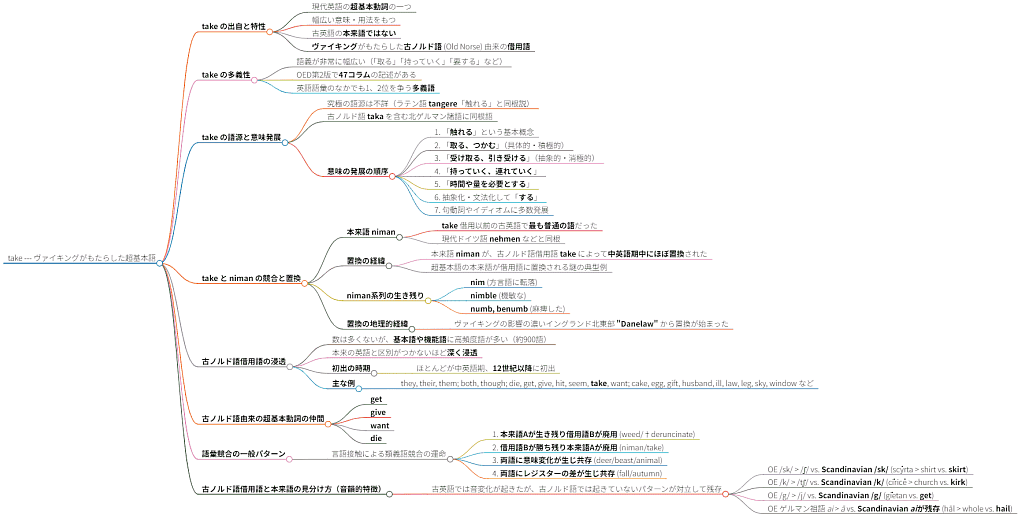
なお,この朝カル講座のシリーズの第1回から第7回についてもマインドマップを作成しています.
・ 「#5857. 2025年度の朝カルシリーズ講座の第1回「she --- 語源論争の絶えない代名詞」をマインドマップ化してみました」 ([2025-05-10-1])
・ 「#5887. 2025年度の朝カルシリーズ講座の第2回「through --- あまりに多様な綴字をもつ語」をマインドマップ化してみました」 ([2025-06-09-1])
・ 「#5915. 2025年度の朝カルシリーズ講座の第3回「autumn --- 類義語に揉み続けられてきた季節語」をマインドマップ化してみました」 ([2025-07-07-1])
・ 「#5949. 2025年度の朝カルシリーズ講座の第4回「but --- きわめつきの多義の接続詞」をマインドマップ化してみました」 ([2025-08-10-1])
・ 「#5977. 2025年度の朝カルシリーズ講座の第5回「guy --- 人名からカラフルな意味変化を遂げた語」をマインドマップ化してみました」 ([2025-09-07-1])
・ 「#6013. 2025年度の朝カルシリーズ講座の第6回「English --- 慣れ親しんだ単語をどこまでも深掘りする」をマインドマップ化してみました」 ([2025-10-01-1])
・ 「#6041. 2025年度の朝カルシリーズ講座の第7回「I --- 1人称単数代名詞をめぐる物語」をマインドマップ化してみました」 ([2025-11-10-1])
シリーズの次回,第9回は,12月20日(土)に「one --- 単なる数から様々な用法へ広がった語」と題して開講されます.開講形式は引き続きオンラインのみで,開講時間は 15:30--17:00 です.ご関心のある方は,ぜひ朝日カルチャーセンター新宿教室の公式HPより詳細をご確認の上,お申し込みいただければ幸いです.
2025-12-12 Fri
■ #6073. B&C の第62節 "The Earlier Influence of Christianity on the Vocabulary" (5) --- Taku さんとの超精読会 [bchel][latin][borrowing][loan_word][christianity][link][voicy][heldio][anglo-saxon][history][helmate][oe]
今朝の Voicy heldio にて「#1657. 英語史の古典的名著 Baugh and Cable を読む (62-5) with Taku さん --- オンライン超精読会より」をお届けしました.本ブログでも3日前にご案内した「#6070. B&C の第62節 "The Earlier Influence of Christianity on the Vocabulary" (4) --- Taku さんとの超精読会」 ([2025-12-09-1]) の続編となります.
引き続き,ヘルメイトの Taku さんこと金田拓さん(帝京科学大学)の進行のもと,B&C の第62節の最後の3文をじっくりと精読しています.具体的な単語が多く列挙されている箇所なので『英語語源辞典』などを引きながら読むと勉強になるはずです.
では,今回の精読対象の英文を掲載しましょう(Baugh and Cable, p. 82) .
Finally, we may mention a number of words too miscellaneous to admit of profitable classification, like anchor, coulter, fan (for winnowing), fever, place (cf. market-place), spelter (asphalt), sponge, elephant, phoenix, mancus (a coin), and some more or less learned or literary words, such as calend, circle, legion, giant, consul, and talent. The words cited in these examples are mostly nouns, but Old English borrowed also a number of verbs and adjectives such as āspendan (to spend; L. expendere), bemūtian (to exchange; L. mūtāre), dihtan (to compose; L. dictāre), pīnian (to torture; L. poena), pīnsian (to weigh; L. pēnsāre), pyngan (to prick; L. pungere), sealtian (to dance; L. saltāre), temprian (to temper; L. temperāre), trifolian (to grind; L. trībulāre), tyrnan (to turn; L. tornāre), and crisp (L. crispus, 'curly'). But enough has been said to indicate the extent and variety of the borrowings from Latin in the early days of Christianity in England and to show how quickly the language reflected the broadened horizon that the English people owed to the church.
B&C読書会の過去回については「#5291. heldio の「英語史の古典的名著 Baugh and Cable を読む」シリーズが順調に進んでいます」 ([2023-10-22-1]) をご覧ください.B&C 全体でみれば,まだまだこの超精読シリーズも序盤といってよいです.今後もゆっくりペースで続けていくつもりです.ぜひ皆さんも本書を入手し,超精読にお付き合いください.
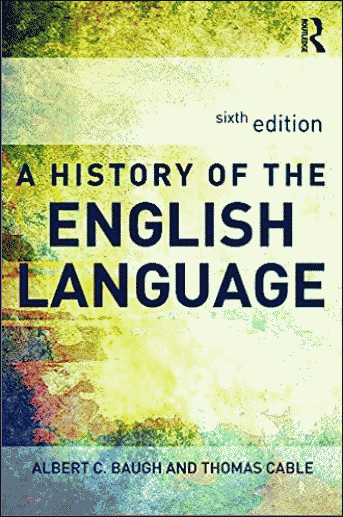
・ Baugh, Albert C. and Thomas Cable. A History of the English Language. 6th ed. London: Routledge, 2013.
2025-12-09 Tue
■ #6070. B&C の第62節 "The Earlier Influence of Christianity on the Vocabulary" (4) --- Taku さんとの超精読会 [bchel][latin][borrowing][loan_word][christianity][link][voicy][heldio][anglo-saxon][history][helmate][oe]
本日 Voicy heldio にて「#1654. 英語史の古典的名著 Baugh and Cable を読む (62-4) with Taku さん --- オンライン超精読会より」をお届けしました.一昨日,12月7日(日)の午前中にオンラインで開催した超精読会の様子を収録したものの一部です.
今回も前回に引き続き,ヘルメイトの Taku さんこと金田拓さん(帝京科学大学)に進行役を務めていただき,さらにヘルメイト数名にもお立ち会いいただきました.おかげさまで,日曜日の朝から豊かで充実した時間を過ごすことができました.ありがとうございます.超精読会の本編だけで1時間半ほど,その後の振り返りでさらに1時間超という長丁場でした.今後 heldio/helwa で複数回に分けて配信していく予定です.
さて,今朝の配信回でカバーしているのは,B&C の第62節の後半の始まりとなる "But the church . . ." からの4文です.以下に,精読対象の英文を掲載します(Baugh and Cable, p. 82) .
But the church also exercised a profound influence on the domestic life of the people. This is seen in the adoption of many words, such as the names of articles of clothing and household use: cap, sock, silk, purple, chest, mat, sack;6 words denoting foods, such as beet, caul (cabbage), lentil (OE lent), millet (OE mil), pear, radish, doe, oyster (OE ostre), lobster, mussel, to which we may add the noun cook;7 names of trees, plants, and herbs (often cultivated for their medicinal properties), such as box, pine,8 aloes, balsam , fennel, hyssop, lily, mallow, marshmallow, myrrh, rue, savory (OE sæperige), and the general word plant. A certain number of words having to do with education and learning reflect another aspect of the church's influence. Such are school, master, Latin (possibly an earlier borrowing), grammatic(al), verse, meter, gloss, and notary (a scribe).
6 Other words of this sort, which have not survived in Modern English, are cemes (shirt), swiftlere (slipper), sūtere (shoemaker), byden (tub, bushel), bytt (leather bottle), cēac (jug), læfel (cup), orc (pitcher), and strǣl (blanket, rug).
7 Cf. also OE cīepe (onion, ll. cēpa), nǣp (turnip; L. nāpus), and sigle (rye, V.L. sigale).
8 Also sæppe (spruce-fir) and mōrbēam (mulberry tree).
B&C読書会の過去回については「#5291. heldio の「英語史の古典的名著 Baugh and Cable を読む」シリーズが順調に進んでいます」 ([2023-10-22-1]) をご覧ください.今後もゆっくりペースですが,続けていきます.ぜひ本書を入手し,超精読にお付き合いいただければ.

・ Baugh, Albert C. and Thomas Cable. A History of the English Language. 6th ed. London: Routledge, 2013.
2025-11-28 Fri
■ #6059. take --- 古ノルド語由来の big word の起源と発達 [etymology][loan_word][lexicology][grammaticalisation][phrasal_verb][asacul][polysemy][collocation][particle][idiom][old_norse][french][contact][borrowing]
明日29日(土)の朝日カルチャーセンター新宿教室での講座では,take という英単語に注目し,その驚くべき起源と発達をたどる予定でいる.この単語は,英語語彙のなかでも最も多義的な単語のひとつである.その意味の広がりと,しかも古ノルド語からの借用語であるという事実に,改めて驚かざるを得ない.
OED 第2版(冊子体)で調べると,動詞 take の項目だけで第17巻の pp. 557--72 を占める.あの OED の小さな文字まで,47コラムほどの分量である.日本語では一般に「取る」と訳されることが多いが,この「取る」という動作概念があまりにも一般的で抽象的であるがゆえに,そこから無数の意味的な発展や共起表現が派生してきた.まさに,英語語彙のなかでも有数の "big word"と言って差し支えないだろう.
この多義的な動詞の歴史をたどると,まず根源にあるのは積極的な行動としての「取る」という意味だ.場所や土地を目的語として「占拠する」といった軍事的な含みをもつ語義だ.ここから派生して,モノを「取る」ことは,それを「自分のものにする」こと,すなわち「所有権を得る」という意味が展開してくる.さらに,モノや人を目的語にとって,何かを「もっていく」,誰かを「連れて行く」へも発展する.
この「積極的に取りにいく」という性質が希薄化していくと,むしろ意味は反対の方向へと向かう.すなわち,「受け取る」「引き受ける」といった,比較的消極的な意味が生まれてくるのだ.
さらに興味深いのは,意味がより希薄化し,いわば文法化 (grammaticalisation) へと進むケースである.例えば,take a walk や take a bath のように,単に特定の動作を行うことを示す,あたかも do に近い補助動詞的な役割を帯び始めるのだ.ここでは「取る」や「受け取る」といった具体的な意味はもはや感じられず,文法的な機能を果たす道具として用いられているにすぎない.この現象は,動詞の語彙的意味が薄れていく過程を示している.
また,take の語彙的価値を高めているのは,句動詞 (phrasal_verb) を生み出す母体としての役割である.take away, take in, take off, take out など,後ろに小辞 (particle) を伴うことで,数限りない表現が生み出されている.これらは1つひとつが独立した意味を持つため,英語学習者にとっては厄介な暗記項目となるが,その豊かさが,英語という言語の表現力を支えている.
加えて,take effect, take place, take part in のように特定の名詞と結びついてイディオム (idiom) を形成する用法も,現代英語では多数存在する.この背景には,中英語期にフランス語の対応する動詞 prendre という単語がどのような目的語をとるのか,という文法的・語彙的な情報を,英語が積極的に参照し,取り入れてきた歴史が関わっていると考えられている.
しかし,この多義的で,これほどまでに英語の語彙体系に深く食い込み,核をなしている動詞 take が,実は英語本来語ではない,という点こそが最も驚くべき事実だ.古英語の本来の「取る」を意味する動詞は niman として存在したにもかかわらず,古英語後期以降に take が古ノルド語から借用されてきたのである.なぜ,古ノルド語からの借用語が,土着の日常的な動詞を駆逐し,英語のなかで最も多義的で強力な "big word" の地位を獲得するに至ったのか.
この現象は,単に語彙の取捨選択の問題にとどまらず,言語接触のメカニズムの複雑さと不思議さを私たちに教えてくれる.この謎について,明日の朝カル講座で考察していきたい.
2025-11-22 Sat
■ #6053. 11月29日(土),朝カル講座の秋期クール第2回「take --- ヴァイキングがもたらした超基本語」が開講されます [asacul][notice][verb][old_norse][kdee][hee][etymology][lexicology][synonym][hel_education][helkatsu][loan_word][borrowing][contact]
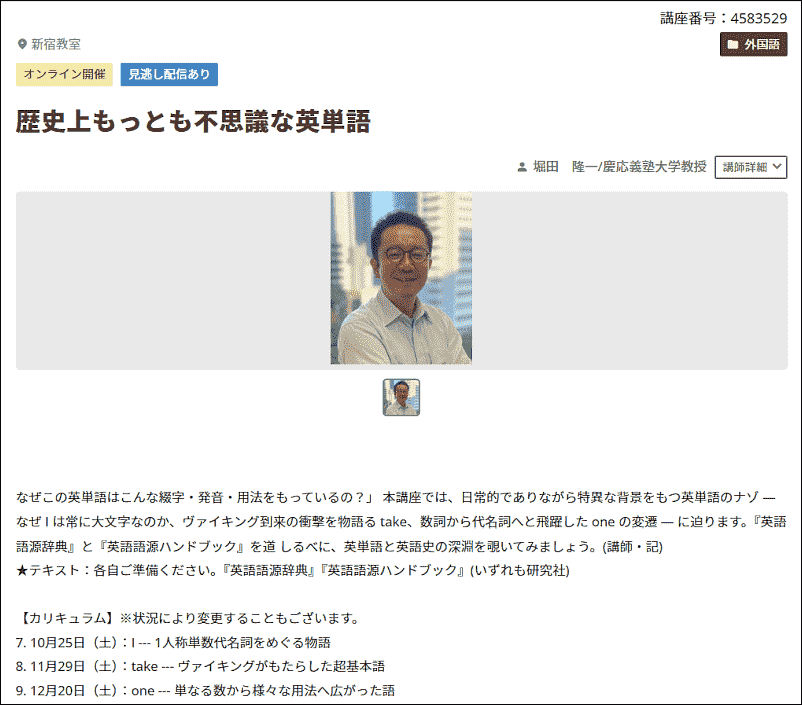
今年度は月1回,朝日カルチャーセンター新宿教室で英語史講座「歴史上もっとも不思議な英単語」シリーズを開講しています.その秋期クールの第2回(今年度通算第8回)が,1週間後の11月29日(土)に迫ってきました.今回取り上げるのは,現代英語のなかでも最も基本的な動詞の1つ take です.
take は,その幅広い意味や用法から,英語話者にとってきわめて日常的な語となっています.しかし,この単語は古英語から使われていた「本来語」 (native word) ではなく,実は,8世紀半ばから11世紀にかけてブリテン島を侵略・定住したヴァイキングたちがもたらした古ノルド語 (old_norse) 由来の「借用語」 (loan_word) なのです.
古ノルド語が英語史にもたらした影響は計り知れず,私自身,古ノルド語は英語言語接触史上もっとも重要な言語の1つと考えています(cf. 「#4820. 古ノルド語は英語史上もっとも重要な言語」 ([2022-07-08-1])).今回の講座では take を窓口として,古ノルド語が英語の語彙体系に与えた衝撃に迫ります.
以下,講座で掘り下げていきたいと思っている話題を,いくつかご紹介します.
・ 古ノルド語の語彙的影響の大きさ:古ノルド語からの借用語は,数こそラテン語やフランス語に及ばないものの,egg, leg, sky のように日常に欠かせない語ばかりです(cf. 「#2625. 古ノルド語からの借用語の日常性」 ([2016-07-04-1])).take はそのなかでもトップクラスの基本語といえます.
・ 借用語 take と本来語 niman の競合:古ノルド語由来の take が流入する以前,古英語では niman が「取る」を意味する最も普通の語として用いられていました.この2語の競合の後,結果的には take が勝利を収めました.なぜ借用語が本来語を駆逐し得たのでしょうか.
・ 古ノルド語由来の他の超基本動詞:take のほかにも,get,give,want といった,英語の骨格をなす少なからぬ動詞が古ノルド語にルーツをもちます.
・ タブー語 die の謎:日常語であると同時に,タブー的な側面をもつ die も古ノルド語由来の基本的な動詞です.古英語本来語の「死ぬ」を表す動詞 steorfan が,現代英語で starve (飢える)へと意味を狭めてしまった経緯は,言語接触と意味変化の好例となります.
・ she や they は本当に古ノルド語由来か?:古ノルド語の影響は,人称代名詞 she や they のような機能語にまで及んでいるといわれます.しかし,この2語についてはほかの語源説もあり,ミステリアスです.
・ 古ノルド語借用語と古英語本来語の見分け方:音韻的な違いがあるので,識別できる場合があります.
形態音韻論的には単音節にすぎないtake という小さな単語の背後には,ヴァイキングの歴史や言語接触のダイナミズムが潜んでいます.今回も英語史の醍醐味をたっぷりと味わいましょう.
講座への参加方法は,前回同様にオンライン参加のみとなっています.リアルタイムでのご参加のほか,2週間の見逃し配信サービスもありますので,ご都合のよい方法でご受講ください.開講時間は 15:30--17:00 です.講座と申込みの詳細は朝カルの公式ページよりご確認ください.
なお,次々回は12月20日(土)で,これも英語史的に実に奥深い単語 one を取り上げる予定です.
(以下,後記:2025/11/25(Tue)))
本講座の予告については heldio にて「「#1640. 11月29日の朝カル講座は take --- ヴァイキングがもたらした超基本語」」としてお話ししています.ぜひそちらもお聴きください.
・ 寺澤 芳雄(編集主幹) 『英語語源辞典』新装版 研究社,2024年.
・ 唐澤 一友・小塚 良孝・堀田 隆一(著),福田 一貴・小河 舜(校閲協力) 『英語語源ハンドブック』 研究社,2025年.
2025-11-08 Sat
■ #6039. New Zealand English におけるマオリ借用語の発音をめぐる社会言語学 [sociolinguistics][new_zealand_english][maori][borrowing][loan_word][pronunciation][orthography][language_planning][writing][standardisation]
NZE には,マオリ語からの借用語が多く入っている.地名や人名などの固有名詞はもちろん,一般語も多く流入している.英語の文脈でマオリ借用語をどのように発音するか,という問題について,Bauer (398--99) が興味深い論点を示している.
The proper pronunciation of Maori is currently a controversial issue in New Zealand, and it is a subject on which feelings run high. The issue is at heart a political rather than a linguistic one, since it is clear linguistically that there is no good reason to expect native-like Maori pronunciation in words which are being used in English. None the less, it has the linguistic consequence that there is a good deal of variation in the way in which Maori loanwords are pronounced in English, with variants close to native Maori norms at the formal end of the spectrum, and much more Anglicised versions --- sometimes irregularly Anglicised versions --- at the other. To give some idea of the variation this can lead to, I present below a few place-names with a Maori pronunciation and one extreme English pronunciation. Variants are heard anywhere on the continuum between these two extremes.
この文章の後に具体例がいくつか挙げられているが,たとえばマオリ語でニュージーランドを表わす Aotearoa (長く白い雲の土地)は,マオリ語母語発音では /aːɔtɛːaɾɔa/ となり,これで発音する英語話者もいれば,そこから完全に英語化した /eɪətiəˈɹəʊə/ として発音する者もいる.また,この2つを両極として,中間的な発音も多数あり得るというのだから,揺れの激しさが想像される.
この揺れの背景には,英語とマオリ語の音韻体系の差異,マオリ語のリテラシー,オーディエンスへの配慮,マオリ語への立ち位置や思い入れ,言語計画・政策上の立場など,様々な言語学的,そしてなかんずく社会言語学的な要因が作用しているのだろう.国号の発音を1つとっても,そこに話者の態度や立場が色濃く反映している可能性があるということだ.
なお,マオリ語をローマ字で表記する際の綴字は,1830年代後半から1840年代までには標準化されていたという (Bauer 398) .意外と早かったのだな,という印象だ.
・ Bauer L. "English in New Zealand." The Cambridge History of the English Language. Vol. 5. Ed. Burchfield R. Cambridge: CUP, 1994. 382--429.
2025-09-19 Fri
■ #5989. B&C の第62節 "The Earlier Influence of Christianity on the Vocabulary" (3) --- Taku さんとの超精読会 [bchel][latin][borrowing][christianity][link][voicy][heldio][anglo-saxon][history][helmate][oe][hellive2025][loan_word]
先日 Voicy heldio でお届けした「#1548. 英語史の古典的名著 Baugh and Cable を読む (62-2) The Earlier Influence of Christianity on the Vocabulary」の続編を,今朝アーカイヴより配信しました.「#1573. 英語史の古典的名著 Baugh and Cable を読む (62-3) with Taku さん --- 「英語史ライヴ2025」より」です.これは去る9月13日(土)の「英語史ライヴ2025」にて,朝の7時過ぎから生配信でお届けしたものです.
今回の超精読会も前回と同様に,ヘルメイトの Taku さんこと金田拓さん(帝京科学大学)に司会を務めていただきました.現場には,私のほか数名のヘルメイトもギャラリーとして参加しており,早朝からの熱い精読会となっています.40分ほどの時間をかけて,18文ほどを読み進めました.2人の精読にかける熱い想いを汲み取りつつ,ぜひお付き合いいただければ.
以下に,精読対象の英文を掲載します(Baugh and Cable, pp. 81--82) .
It is obvious that the most typical as well as the most numerous class of words introduced by the new religion would have to do with that religion and the details of its external organization. Words are generally taken over by one language from another in answer to a definite need. They are adopted because they express ideas that are new or because they are so intimately associated with an object or a concept that acceptance of the thing involves acceptance also of the word. A few words relating to Christianity such as church and bishop were, as we have seen, borrowed earlier. The Anglo-Saxons had doubtless plundered churches and come in contact with bishops before they came to England. But the great majority of words in Old English having to do with the church and its services, its physical fabric and its ministers, when not of native origin were borrowed at this time. Because most of these words have survived in only slightly altered form in Modern English, the examples may be given in their modern form. The list includes abbot, alms, altar, angel, anthem, Arian, ark, candle, canon, chalice, cleric, cowl, deacon, disciple, epistle, hymn, litany, manna, martyr, mass, minster, noon, nun, offer, organ, pall, palm, pope, priest, provost, psalm, psalter, relic, rule, shrift, shrive, shrive, stole, subdeacon, synod, temple, and tunic. Some of these were reintroduced later.
B&C読書会の過去回については「#5291. heldio の「英語史の古典的名著 Baugh and Cable を読む」シリーズが順調に進んでいます」 ([2023-10-22-1]) をご覧ください.今後もゆっくりペースですが,続けていきます.ぜひ本書を入手し,超精読にお付き合いいただければ.

・ Baugh, Albert C. and Thomas Cable. A History of the English Language. 6th ed. London: Routledge, 2013.
2025-08-25 Mon
■ #5964. B&C の第62節 "The Earlier Influence of Christianity on the Vocabulary" (2) --- Taku さんとの超精読会 [bchel][latin][borrowing][christianity][link][voicy][heldio][anglo-saxon][history][helmate][oe]
一昨日に Voicy heldio でお届けした「#1546. 英語史の古典的名著 Baugh and Cable を読む (62-1) The Earlier Influence of Christianity on the Vocabulary」の続編を,今朝こちらのアーカイヴより配信しました.
同著の第62節の第1段落の後半部分,But で始まる部分から段落終わりまでを,ヘルメイトの Taku さんこと金田拓さん(帝京科学大学)と超精読しています.21分ほどの時間をかけて,じっくりと10行半ほど読み進めました.2人のおしゃべり,蘊蓄,精読にかける熱い想いを汲み取っていただければ幸いです.
精読対象の英文を,前回取り上げた箇所も含めて掲載します(Baugh and Cable, p. 81) .ぜひ超精読にお付き合いください.
62. The Earlier Influence of Christianity on the Vocabulary.
From the introduction of Christianity in 597 to the close of the Old English period is a stretch of more than 500 years. During all this time Latin words must have been making their way gradually into the English language. It is likely that the first wave of religious feeling that resulted from the missionary zeal of the seventh century, and that is reflected in intense activity in church building and the establishing of monasteries during this century, was responsible also for the rapid importation of Latin words into the vocabulary. The many new conceptions that followed in the train of the new religion would naturally demand expression and would at times find the resources of the language inadequate. But it would be a mistake to think that the enrichment of the vocabulary that now took place occurred overnight. Some words came in almost immediately, others only at the end of this period. In fact, it is fairly easy to divide the Latin borrowings of the Second Period into two groups, more or less equal in size but quite different in character. The one group represents words whose phonetic form shows that they were borrowed early and whose early adoption is attested also by the fact that they had found their way into literature by the time of Alfred. The other contains words of a more learned character first recorded in the tenth and eleventh centuries and owing their introduction clearly to the religious revival that accompanied the Benedictine Reform. It will be well to consider them separately.
B&C読書会の過去回については「#5291. heldio の「英語史の古典的名著 Baugh and Cable を読む」シリーズが順調に進んでいます」 ([2023-10-22-1]) をご覧ください.今後もゆっくりペースですが,続けていきます.ぜひ本書を入手し,超精読にお付き合いいただければ.

2025-08-23 Sat
■ #5962. B&C の第62節 "The Earlier Influence of Christianity on the Vocabulary" (1) --- Taku さんとの超精読会 [bchel][latin][borrowing][christianity][link][voicy][heldio][anglo-saxon][history][helmate][oe]
今朝の Voicy heldio で「#1546. 英語史の古典的名著 Baugh and Cable を読む (62-1) The Earlier Influence of Christianity on the Vocabulary」を配信しました.一昨日,ヘルメイトの Taku さんこと金田拓さん(帝京科学大学)とともに,久しぶりの Baugh and Cable 超精読会を開きました.1時間を越える熱い読書会となりましたが,1時間以上をかけて読み進めたのは第62節の第1段落のみです.その豊かな読解の時間を heldio 収録してあります.その様子を,前編と後編の2回に分けて,heldio アーカイヴとして配信します.
第62節では,古英語期の比較的早い時期におけるラテン語からの語彙的影響について,具体例とともに論じられています.精読を味わうとともに,2人のおしゃべりも楽しみながら,古英語とラテン語の関係に思いを馳せてみてください.
今朝の配信回で対象とした部分のテキスト(Baugh and Cable, p. 81) を以下に掲載しますので,超精読にお付き合いいただければ.
62. The Earlier Influence of Christianity on the Vocabulary.
From the introduction of Christianity in 597 to the close of the Old English period is a stretch of more than 500 years. During all this time Latin words must have been making their way gradually into the English language. It is likely that the first wave of religious feeling that resulted from the missionary zeal of the seventh century, and that is reflected in intense activity in church building and the establishing of monasteries during this century, was responsible also for the rapid importation of Latin words into the vocabulary. The many new conceptions that followed in the train of the new religion would naturally demand expression and would at times find the resources of the language inadequate.
B&C読書会の過去回については「#5291. heldio の「英語史の古典的名著 Baugh and Cable を読む」シリーズが順調に進んでいます」 ([2023-10-22-1]) をご覧ください.

・ Baugh, Albert C. and Thomas Cable. A History of the English Language. 6th ed. London: Routledge, 2013.
2025-08-14 Thu
■ #5953. ギリシア語 ei の英語への取り込まれ方 [digraph][vowel][diphthong][greek][latin][loan_word][borrowing]
連日 crocodile の語形・綴字について調べているが,その過程で表記の問題に関心をもった.ギリシア語の κροκόδειλος の第3音節にみえる ει の2重字 (digraph) が,ラテン語に取り込まれる際には crocodīlus のように1つの母音字で翻字されている.現代英語の綴字でも,確かに crocodile と i の1文字のみの表記だ.
調べてみると,ギリシア単語が間接的あるいは直接的に英語に取り込まれる際には,いくつかのパターンがあるという.小さな問題ではあるが,Upward and Davidson (220--21) によれば,英語の綴字に関して緩い傾向(および恣意的な振る舞い)がみられる.
Gr EI transliterated as E or I
Although a digraph, Gr EI perhaps represented a simple vowel sound rather than a diphthong, and was liable to misspelling in classical Gr as just iota or eta.
Latin transliterated Gr EI as either E or I, not as EI. Direct transliteration from Gr to Eng giving EI, as in eirenic, kaleidoscope, pleistocene, seismic, protein, Pleiades typically date from the 19th or 20th centuries, and have therefore not come via Lat. The contrast between such modern transliterations and the older Lat-derived ones is seen in pairs such as apodeictic/apodictic 'demonstrably true' (< Latin apodicticus < Gr apodeiktikos), cheiropractic/chiropractic, Eirene/Irene.
Lat gave Eng an arbitrary spelling variation by tending to transliterate Gr EI as E before a vowel and as I before a consonant: thus panacea, truchea (< Gr panakeia, tracheia) but icon, idol, lichen (< Gr eikōn, eidōlon, leichēn), and similarly with crocodile, dinosaur, empirical, idyll, pirate. Note, however, angiosperm (< Gr aggeion) with I before O, and hygiene (< Gr hugieinē) with E before N preventing a repetition of I in *hygiine.
Underlying the Y of therapy, idolatry is Gr -EIA (Gr latreia 'worship', therapeia) whereas Gr -IA underlies the Y of theory, history (< Gr theōria, historia).
さほど単純な傾向でもないと分かるが,時と場合によって,ギリシア語からの直接借用なのかラテン語を経由しての間接借用なのかが示唆されることがあるというのは興味深い.「#3373. 「示準語彙」」 ([2018-07-22-1]) の話題を想起させる.
・ Upward, Christopher and George Davidson. The History of English Spelling. Malden, MA: Wiley-Blackwell, 2011.
2025-08-13 Wed
■ #5952. crocodile の英語史 --- MED で綴字を確認する [spelling][etymological_respelling][french][loan_word][borrowing][metathesis][me][animal][med]
昨日の記事 ([2025-08-12-1]) に続き crocodile を考える記事.今回は,同語の初出が中英語期なので MED を引いてみることにする.MED では cocodril (n.) として見出しが立てられている(crocodile ではないことに注意).以下,挙げられているすべての用例を再現する.
(a1387) Trev.Higd.(StJ-C H.1)3.109 : A cokedrille..is comounliche twenty cubite long.
(a1398) *Trev.Barth.(Add 27944)154b/a : Emdros is a litil beste..yif þis litil beste fynde a cocodrill slepyng, he..comeþ in atte þe mowthe in to þe cocodrill and in his wombe, and alto renteþ his guttes inward and sleeþ him, and dyeþ so.
(a1398) *Trev.Barth.(Add 27944)179a/a : In Egipt ben ful many cokedrilles.
(a1398) *Trev.Barth.(Add 27944)281a/b : Cocodrillus haþ þat name of ȝolow colour, as ysidir seiþ..and woneþ boþe in water and in londe..and is y armed wiþ grete teeþ and clawes..and resteþ in water by night and by day in londe, and leiþ eyren..among bestes oonliche þe cocodrille moeueþ þe ouer iowe.
(a1398) *Trev.Barth.(Add 27944)324a/b : The Cokodrille eiren beþ more þan gees eiren, and þe male and female sitteþ þeron on broode..now þe male and now þe female..and þese eiren beþ venemous..and beþ horrible bothe to smelle and to taste.
c1400(?a1300) KAlex.(LdMisc 622)5711 : Two heuedes it had..To a cokedrille þat on was liche.
c1400(?a1300) KAlex.(LdMisc 622)6544 : He sleþ ypotames and kokedrille.
?a1425(c1400) Mandev.(1) (Tit C.16)131/11 : Þat lond..is full of serpentes, of dragouns & of Cokadrilles.
?a1425(c1400) Mandev.(1) (Tit C.16)131/12 : Cocodrilles ben serpentes ȝalowe & rayed abouen, & han iiij feet & schorte thyes..þere ben somme þat han v fadme in lengthe & summe..of x.
?a1425(c1400) Mandev.(1) (Tit C.16)192/17 : Cokodrilles..slen men & þei eten hem wepynge.
(?a1390) Daniel *Herbal (Add 27329)f.87ra : In þe lond of Egipt also groweth bene, but it is ful of prikelles & therfore cocodrilles shonye it, for dred of prikelyng her eyne.
?a1425 Mandev.(2) (Eg 1982)142/13 : Thurgh oute all Inde es grete plentee of cocodrilles.
(?1440) Palladius (DukeH d.2)1.960 : A cocodrillis hide.
c1440 PLAlex.(Thrn)70/28 : Þaire bakkes ware harder þan cocadrillez.
これらの例に関する限り,すべての綴字が cocodril 系であり,crocodile 系は現われていない.
語形と綴字にもっぱら注目しているとはいえ,こうして中英語からの例文を眺めていると,当時のワニ観も合わせて味わうことができてなかなか楽しい.
2025-08-12 Tue
■ #5951. crocodile の英語史 --- OED で語源と綴字を確認する [spelling][etymological_respelling][french][latin][greek][italian][spanish][loan_word][borrowing][metathesis][me][animal][oed]
「#5948. crocodile の英語史 --- lacolaco さんからのインスピレーション」 ([2025-08-09-1]) に続き,crocodile の語形と綴字の問題に注目する.まず OED を引いて crocodile (n.)の語源欄をのぞいてみる.
Middle English cocodrille, cokadrill, etc. < Old French cocodrille (13--17th cent.) = Provençal cocodrilh, Spanish cocodrilo, Italian coccodrillo, medieval Latin cocodrillus, corruption of Latin crocodīlus (also corcodilus), < Greek κροκόδειλος, found from Herodotus downward. The original form after Greek and Latin was restored in most of the modern languages in the 16--17th cent.: French crocodile (in Paré), Italian crocodillo (in Florio), Spanish crocodilo (in Percival).
古典期のギリシア語やラテン語においては crocodīlus 系の語形だったが,中世ラテン語において語形が崩れて cocodrillus 系となり,これがロマンス諸語においても定着し,中英語へもフランス語を経由してこの系列の語形で入ってきた.ところが,これらの近代諸言語の大半において,16--17世紀の語源的綴字 (etymological_respelling) の慣習により,crocodile 系へ回帰した.というのがおおまかな流れである.
英単語としての crocodile の出現は,直接にはフランス語 cocodrille を中英語期に借用したときに遡る.OED の初例は1300年頃となっている.中英語期からの4例を示そう.
c1300 What best is the cokadrille. (Kyng Alisaunder 6597)
1382 A cokedril..that is a beest of foure feete, hauynge the nether cheke lap vnmeuable, and meuynge the ouere. (Bible (Wycliffite, early version) Leviticus xi. 29)
c1400 In that contre..ben gret plentee of Cokadrilles..Theise Serpentes slen men, and thei eten hem wepynge. (Mandeville's Travels (1839) xxviii. 288)
1483 The cockadrylle is so stronge and so grete a serpent. (W. Caxton, translation of Caton E viii b)
その後,16世紀後半以降からの例では,すべて crocodile 系列の綴字が用いられている
2025-07-09 Wed
■ #5917. 『英語史新聞』第12号が公開されました [hel_herald][notice][khelf][hel_education][link][helkatsu][etymological_respelling][relative_pronoun][loan_word][borrowing][lexicology][statistics][negative_cycle][syntax][helvillian]
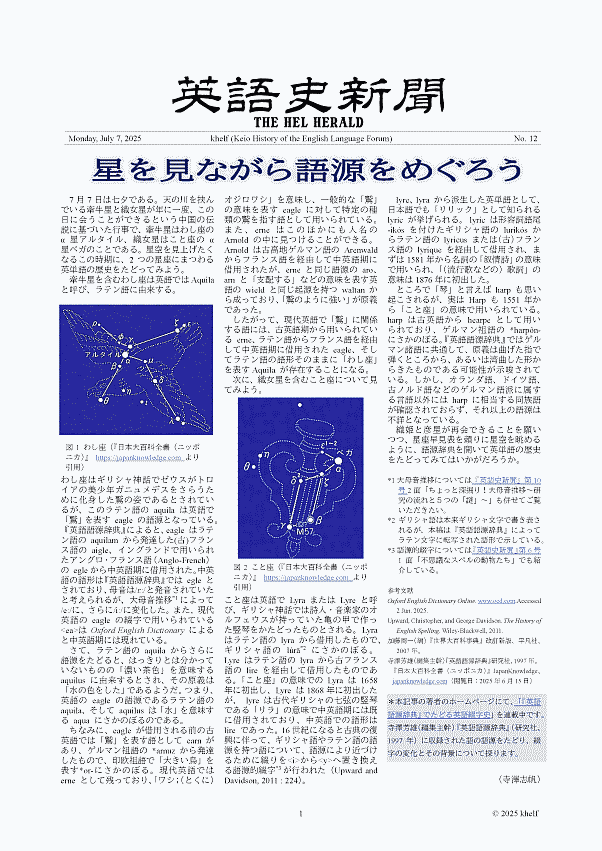
7月7日の七夕,khelf(慶應英語史フォーラム)による『英語史新聞』シリーズの第12号がウェブ上で公開されました.こちらよりPDFで自由に閲覧・ダウンロードできます.
数ヶ月前から,七夕の日を公開日と定め,執筆陣や編集陣が協力して準備を進めてきました.例によって公開前夜はぎりぎりまで最終調整に追われていましたが,できあがった紙面については,どうぞご安心ください.珠玉のコンテンツが満載です.企画,執筆,編集と今号の制作に関わったすべての khelf メンバーに,まずは労いと感謝の言葉を述べたいと思います.よく頑張ってくれました,ありがとうございます!
さて,今号も4面構成となっています.どのような記事が掲載されているか,具体的に紹介していきましょう.まず第1面は,七夕の公開日に合わせ「星を見ながら語源をめぐろう」と題するロマンチックな巻頭記事です.執筆者は,本ブログや heldio でも語源的綴字 (etymological_respelling) に関する研究でお馴染みの,khelf の寺澤志帆さんです.彦星(わし座のアルタイル)と織姫(こと座のベガ)にちなみ,2つの星座にまつわる単語の歴史をたどります.「こと座」 (Lyra) に関しては,lyre の綴りが中英語期の lire から,語源のギリシャ語に近づけるために16世紀に y を用いる形へ変更されたという語源的綴字の実例にも触れられており,執筆者の専門知識が活かされた記事となっています.
続く第2面の記事は,「wh から始まる関係代名詞の歴史」です.こちらは学部4年生の Y. T. さんによる本格的な英語史コンテンツです.私たちが当然のように使っている who や which は,古英語の時代には,「誰」「どれ」を意味する疑問詞でしかありませんでした.関係代名詞としては指示詞に由来する that の祖先などが用いられていましたが,中英語期以降,which を皮切りに wh 疑問詞が,関係代名詞の用法を獲得してきました.ただし,who については,関係代名詞として定着するのは意外にも17世紀に入ってからと,比較的遅いのです.その過渡期には,Shakespeare の作品で,人を先行詞にとる場合に which が感情的な文脈で用いられていました.関係代名詞をめぐる歴史には,単なる文法規則の変化にとどまらない,社会言語学的にダイナミックな変化の過程が関わっていたのです.
第3面の上部にみえるのは「英語史ラウンジ by khelf」の連載コーナーです.今回は,青山学院大学の寺澤盾先生へのインタビューの後編をお届けします.記事執筆者は khelf 会長の青木輝さんです.寺澤先生の「推し本」として,中島文雄『英語発達史』や H. Bradley 『英語発達小史』など,英語史研究における古典的名著が複数紹介されます.また,英語史を学ぶ魅力について,「面白い」で終わらず「なぜ」と問い続けることの重要性が説かれており,研究者を志す学生には特に示唆に富む内容となっています.
そして,3面の下部では,第2面でちらっと出題されている「英語史クイズ BASIC」の答えと詳しい解説を読むことができます.現代英語の語彙における借用語の割合に関するクイズですが,問いも答えも,ぜひ記事を熟読していただければ.記事執筆者は,大学院生の小田耕平さんです.
最後の第4面には,大学院生の疋田海夢さんによる本格的な英語史の記事「Not は否定の「強調」!? ~Jespersen's Cycle と「古都」としての言語観~」が掲載されています.これは,英語の否定文の発達を説明する "Jespersen's Cycle" に関する解説と論考です.ここで紹介される「否定辞の弱化→強調語の追加→強調語の否定辞化」というサイクルはフランス語やドイツ語でも見られる現象ですが,記事ではさらに,現代アメリカ英語のスラング squat (例: Claudia saw squat.) の事例を取り上げ,このサイクルが現代,そして未来へと続いている可能性を示唆しています.
このように,今号もすべての記事が khelf メンバーの熱意と探究心の結晶です.英語史を研究する学生たちが本気で作り上げた『英語史新聞』第12号を,ぜひじっくりとお読みいただければ幸いです.
最後に,hellog 読者の皆さんへ1点お伝えします.もし学校の授業などの公的な機会(あるいは,その他の準ずる機会)にて『英語史新聞』を利用される場合には,ぜひ上記 heldio 配信回のコメント欄より,あるいはこちらのフォームを通じてご一報くださいますと幸いです.khelf の活動実績となるほか,編集委員にとっても励みともなりますので,ご協力のほどよろしくお願いいたします.ご入力いただいた学校名・個人名などの情報につきましては,khelf の実績把握の目的のみに限り,記入者の許可なく一般に公開するなどの行為は一切行なわない旨,ここに明記いたします.フィードバックを通じ,khelf による「英語史をお茶の間に」の英語史活動(hel活)への賛同をいただけますと幸いです.
最後に『英語史新聞』のバックナンバー(号外を含む)も紹介しておきます.こちらも合わせてご一読ください(khelf HP のこちらのページにもバックナンバー一覧があります).
・ 『英語史新聞』第1号(創刊号)(2022年4月1日)
・ 『英語史新聞』号外第1号(2022年4月10日)
・ 『英語史新聞』第2号(2022年7月11日)
・ 『英語史新聞』号外第2号(2022年7月18日)
・ 『英語史新聞』第3号(2022年10月3日)
・ 『英語史新聞』第4号(2023年1月11日)
・ 『英語史新聞』第5号(2023年4月10日)
・ 『英語史新聞』第6号(2023年8月14日)
・ 『英語史新聞』第7号(2023年10月30日)
・ 『英語史新聞』第8号(2024年3月4日)
・ 『英語史新聞』第9号(2024年5月12日)
・ 『英語史新聞』第10号(2024年9月8日)
・ 『英語史新聞』号外第3号(2024年9月8日)
・ 『英語史新聞』第11号(2024年12月30日)
2025-07-07 Mon
■ #5915. 2025年度の朝カルシリーズ講座の第3回「autumn --- 類義語に揉み続けられてきた季節語」をマインドマップ化してみました [asacul][mindmap][notice][kdee][hee][etymology][hel_education][lexicology][ame_bre][french][synonym][loan_word][borrowing][link]
6月21日(土)に,今年度の朝日カルチャーセンターのシリーズ講座「歴史上もっとも不思議な英単語」の第3回として「autumn --- 類義語に揉み続けられてきた季節語」が,新宿教室にて開講されました.Voicy heldio にて「#1478. 6月21日の朝カル講座では季節語に注目します --- 発売直後の『英語語源ハンドブック』も大活躍するはず」で予告した通りです.
この第3回講座の内容を markmap というウェブツールによりマインドマップ化して整理しました.復習用にご参照いただければ.
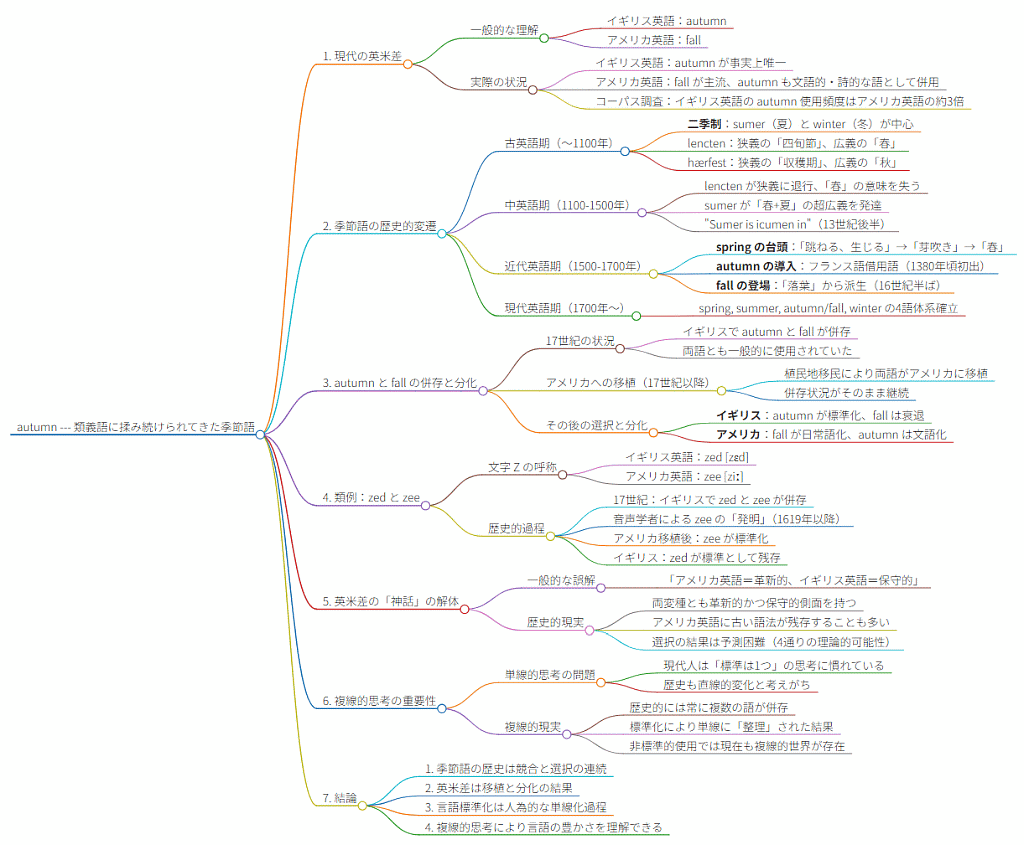
なお,この朝カル講座のシリーズの第1回,第2回についてもマインドマップを作成しています.「#5857. 2025年度の朝カルシリーズ講座の第1回「she --- 語源論争の絶えない代名詞」をマインドマップ化してみました」 ([2025-05-10-1]) および「#5887. 2025年度の朝カルシリーズ講座の第2回「through --- あまりに多様な綴字をもつ語」をマインドマップ化してみました」 ([2025-06-09-1]) の記事をご覧ください.
シリーズの第4回は,7月26日(土)に「but --- きわめつきの多義の接続詞」と題して開講されます.ご関心のある方は,ぜひ朝日カルチャーセンター新宿教室の公式HPより詳細をご確認の上,お申し込みいただければ.
2025-05-11 Sun
■ #5858. 言語において変わるものと変わらないもの --- 「いのほた言語学チャンネル」より [inohota][youtube][language_change][historical_linguistics][notice][christianity][oe][loan_word][borrowing]
同僚の井上逸兵さん(慶應義塾大学)と運営している YouTube 「いのほた言語学チャンネル」は,原則として毎週水曜日と日曜日の午後6時に最新回が配信されています.多くの方にご覧いただいています.ありがとうございます.おかげさまで言語学系のチャンネルとして少しずつ知られるようになってきました(チャンネル登録者は目下1.42万人).
1週間前に配信された「#333. 変化したことより変化してないことの方がおもしろい!?新しい歴史言語学」が,思いのほかよく視聴されています.20分ほどの動画です.ぜひご視聴いただければ.
この回のテーマは,本ブログでも中心的に取り上げてきた言語変化 (language_change) です.言語は常に揺れ動き,時代とともにその姿を変えていきますが,その一方で,変化しない要素も存在します.今回の動画では,この言語変化のダイナミズムと,その陰に潜む不変性に焦点を当てました.
まず言語変化研究の現状を概観し,歴史言語学 (historical_linguistics) における伝統的な視点を紹介しています.一般的に,歴史言語学は,ある言語に注目し,その変遷の歴史を追う学問と捉えられています.しかし,言語の歴史を捉える上で重要なのは,変化した事象だけでなく,連綿と受け継がれてきた,つまり変わらなかった事象にも目を向けることであると論じました.
社会や文化が大きく変動する際に,言語もまた影響を受け,発音が変容したり,新しい語彙が生まれたり,既存の語の意味が変わったり,あるいは文法が変化したりします.しかし,その一方で,社会の変化にもかかわらず,従来の形式を保持し続ける言語項目も存在します.動画では,この「不変化」の重要性について,具体的な例を挙げながら議論を展開しました.
特に興味深い例として簡単に触れたのが,英語における God という単語です.古英語期,イングランドにキリスト教が浸透する過程で,多くのキリスト教関連用語がラテン語から導入されました.しかし,「神」という最も根源的な概念を表わす単語は,対応するラテン語の deus を借りるなどではなく,ゲルマン語起源の god が生き残りました.なぜ,他の多くの用語がラテン語によって置き換えられたにもかかわらず,この単語については現代に至るまでその形を保ち続けているのでしょうか.この問いを探ることは,単なる語源研究にとどまりません.言語共同体の文化や歴史に迫ろうとする試みでもあります.以下に関連する過去記事を挙げておきます.
・ 「#32. 古英語期に借用されたラテン語」 ([2009-05-30-1])
・ 「#865. 借用語を受容しにくい語彙領域は何か」 ([2011-09-09-1])
・ 「#1619. なぜ deus が借用されず God が保たれたのか」 ([2013-10-02-1]),
・ 「#2663. 「オープン借用」と「むっつり借用」 (1)」 ([2016-08-11-1])
・ 「#3382. 神様を「大日」,マリアを「観音」,パライソを「極楽」と訳したアンジロー」 ([2018-07-31-1])
動画では,この他にも,言語(不)変化の背後にある力学について触れています.言語は,川の流れのように常に変化していきます.しかし,その川底には,時を超えて変わらない岩盤のような要素も存在しているのです.言語変化という現象を多角的に捉える視点を提供できたのであれば幸いです.
2025-05-03 Sat
■ #5850. 英語語彙史概論の講義内容を NotebookLM でポッドキャスト対談に仕立て上げました [ai][notebooklm][hel_education][vocabulary][lexicology][borrowing][loan_word][word_formation][derivation][compound][shortening][notice][youtube]
昨日の記事「#5849. Helvillian 5月号について語るAI音声対談」 ([2025-05-02-1]) で,Google NotebookLM の最新の音声対談化サービスを紹介した.あまりに革新的で便利,かつ応用可能性も広そうなので,いろいろといじって遊んでいるところである.
以前,英語語彙史概論の講義を行なったときの講義資料を Google NotebookLM に投げ込み,雑なプロンプトで音声対談生成を依頼した.待つこと数分.出力された音声ファイルを確認すると,改めて驚いたが,ほぼこのまま外に出せる出来映えだ.6分42秒ほどの対談に,90分講義のエッセンスが詰まっていた.
この驚きの対談とそれを紹介する音声配信を,本日 stand.fm の「英語史つぶやきチャンネル (heltalk)」より「英語語彙史概論 by NotebookLM」として公開した.さらにそこから YouTube 化(静止画像付き)でも配信したが,それが上掲の動画である(感激のコメント等を含めて11分29秒).
詳細な情報を対談という形式に落とし込める生成AIの技術は,情報の収集や理解にとどまらず一般の学びにも大きく貢献する可能性がある.日々英語史の音声配信をしている者として,脅威でもあるが大きな希望でもある.活用法と注意点を本格的に探っていきたい.
Powered by WinChalow1.0rc4 based on chalow